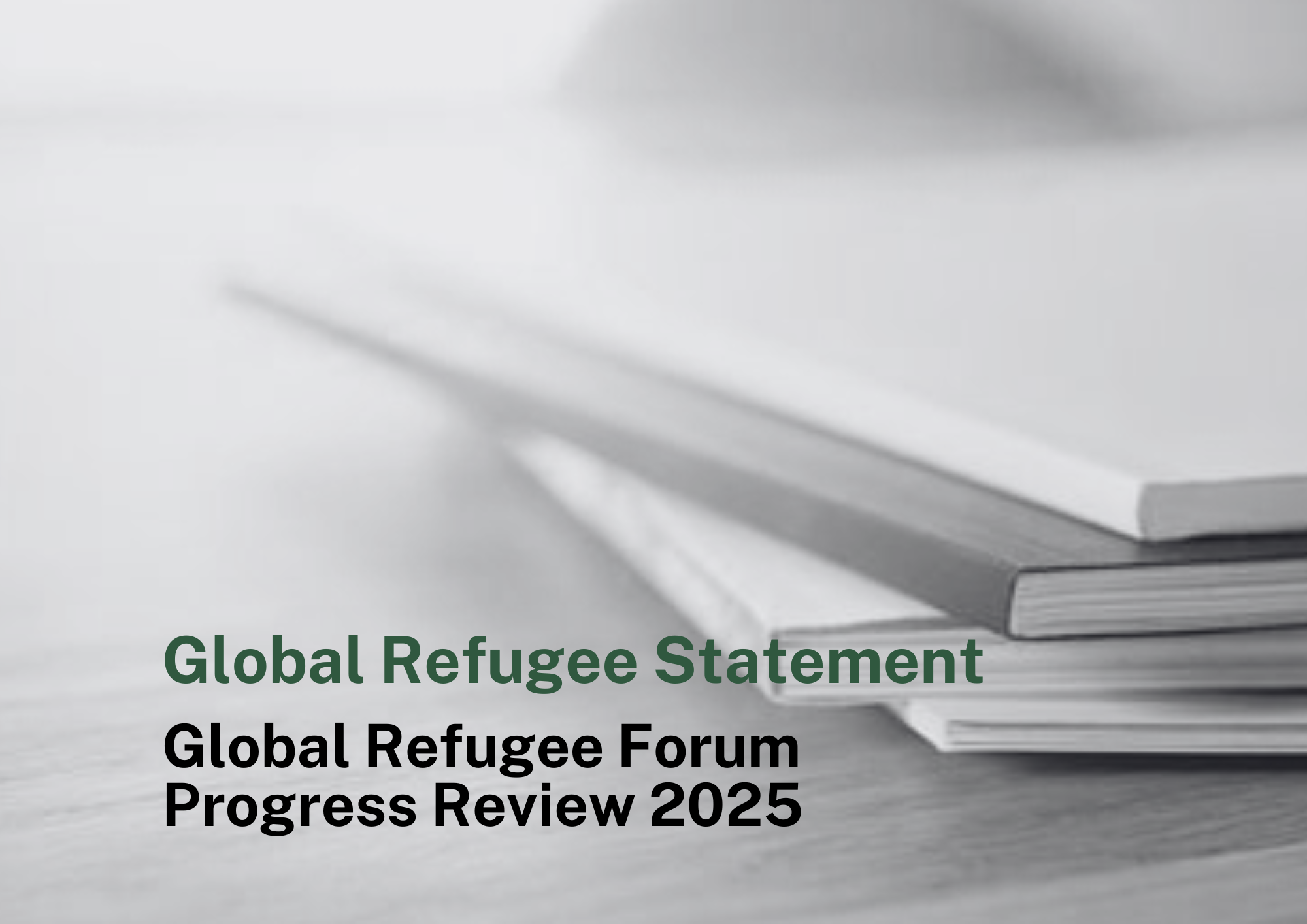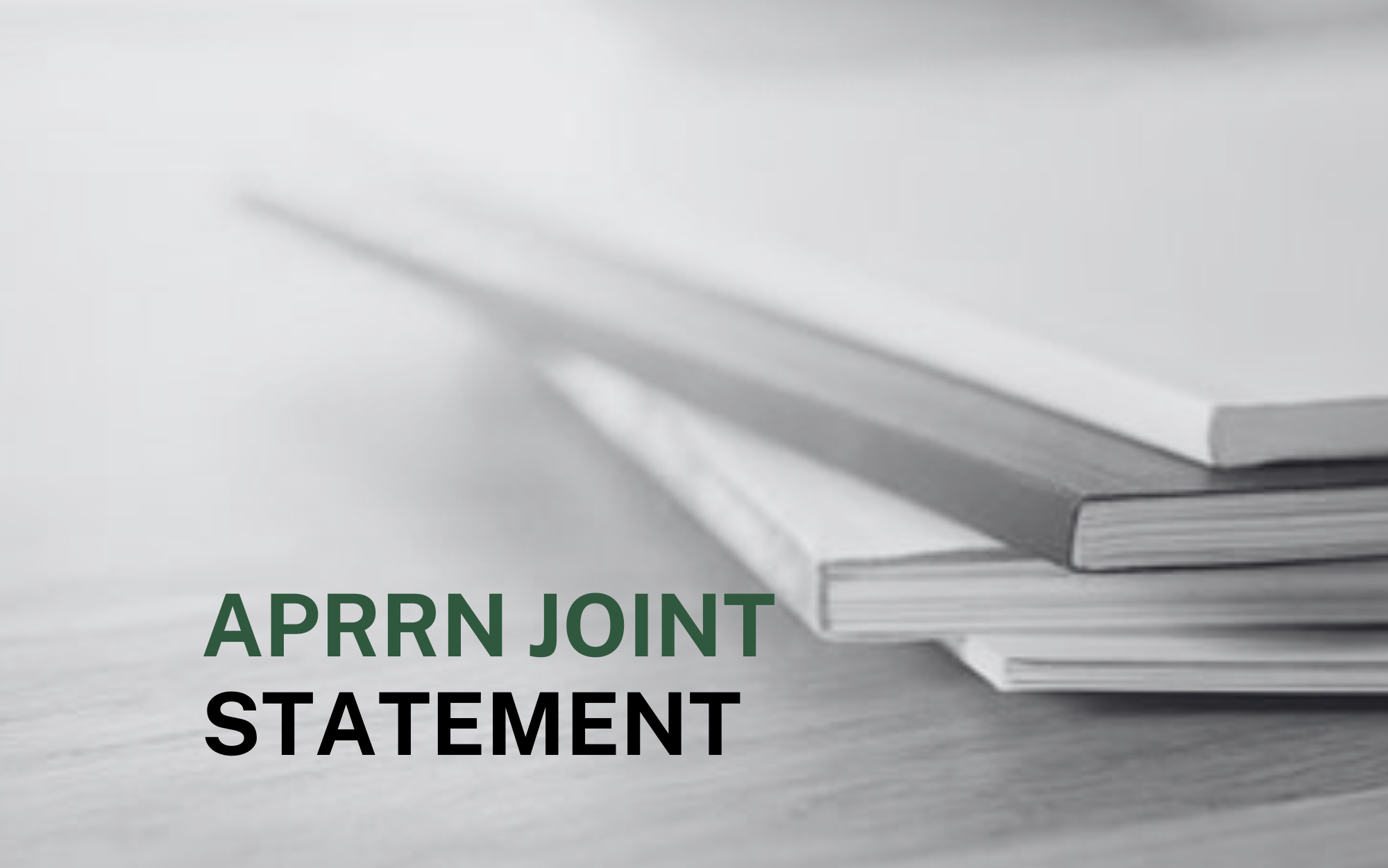Virtual donor conference on “Sustaining Support for the Rohingya Refugee Response”
22 October 2020
The Asia Pacific Refugee Rights Network (APRRN) welcomes the call for renewed commitment to sustained support for the humanitarian response and to comprehensive and sustainable solutions for Rohingya refugees and host communities across the region. While the displacement and statelessness crisis faced by the Rohingya ultimately requires a solution by Myanmar, protection, legal documentation, and access to services for Rohingya in host countries across the region are urgently needed now.
As conditions within Rakhine State continue to deteriorate, prospects for safe, dignified, and voluntary return to Myanmar for Rohingya refugees in the region are diminishing and leaving millions of Rohingya in a cycle of increasing vulnerability and marginalisation. Thus, it is time for the region and the wider international community to work together to find comprehensive and sustainable alternative solutions and develop effective responsibility sharing arrangements, in the spirit of the Global Compact on Refugees. We must work towards protecting and granting basic rights to Rohingya refugees, advancing durable solutions, including increased resettlement as a complementary pathway, while continuing efforts to support the creation of conducive and lasting conditions in Myanmar for return and for the protection, human security, and human rights of all people in Rakhine State.
Protection Frameworks and Refugee Rights in Host Countries
Many states in the region have long hosted Rohingya refugees and have provided them with humanitarian assistance. However, in the absence of refugee protection frameworks and legislations, this assistance remains ad hoc and Rohingya refugees in the region continue to lack legal documentation, access to affordable health services and accredited education, as well as a means to support themselves through legal work. This lack of access to legal rights and protection results in entrenched destitution and vulnerability for refugees. Without legal documentation, Rohingya refugees are still subject to arrest, detention, and potential refoulement in many countries. Without the ability to work legally, most Rohingya cannot afford basic services such as healthcare. Without access to accredited education, Rohingya children and youth risk becoming a 'lost generation', and Rohingya girls are at an even greater risk of child marriage and early pregnancy. Most countries in the region also lack structured programmes to teach Rohingya refugees local languages and cultivate social cohesion with local communities. Such conditions exacerbate both the marginalisation of Rohingya refugees and xenophobia against them.
Refugee Reception and Access to Emergency Services in Host Countries
In the context of the COVID-19 pandemic, the past few months saw Rohingya boats being turned away across the region, accompanied by a dramatic rise in xenophobic sentiment against Rohingya refugees. More than two thousand Rohingya, including a large proportion of women and children, attempted to take arduous sea journeys across the Andaman sea in search of safety during 2020, and hundreds have reportedly died or gone missing at sea. In the absence of a comprehensive regional response to maritime movements and arbitrary unilateral policies being adopted by states in the region to accept or turn away new arrivals, the lives of Rohingya searching for safety shall continue to be at threat in the Bay of Bengal and Andaman Sea. A regional framework for search and rescue as well as predictable and timely disembarkation is urgently needed. Response frameworks must also attend to the immediate needs of the rescued Rohingya refugees, including access to adequate shelter and emergency health services. Newly arriving Rohingya refugees should have immediate access to protection and assistance, to UNHCR, and should not be held in immigration detention.
Rohingya Empowerment and Participation
Rohingya refugees in the region do not wish to be a burden to their host countries. Neither do they wish to take rights away from local communities. They want protection, security, basic rights to survive with dignity, and the opportunity to contribute to their host communities as well as their own communities. There are many examples across the region where Rohingya refugees are already leading and creating positive change - establishing and running learning centres to educate their children, starting adult literacy classes, joining humanitarian NGOs as interpreters and health workers, and even pooling funds and mobilising humanitarian assistance to support host communities hit by natural disasters. Many Rohingya have set up community organisations, including those focusing on women and youth, to provide informal education, skills building, information on health and other essential services, and some are actively working to strengthen relations with their host communities to enhance peaceful co-existence. Rohingya refugees, in all their diversity, know the needs and issues within their communities better than anyone. And yet they continue to be excluded from decision-making on their lives. We must work together to identify, empower, and amplify Rohingya voices, experiences, leadership and potential across the region. Opening up opportunities for increased Rohingya participation at different levels, from camp, community, and neighbourhood levels to public fora and policy dialogues, as well as in education and capacity building programmes, would enable more meaningful involvement, effective community leadership, and a strengthened sense of responsibility among Rohingya refugees towards their host countries. It would also give Rohingya refugees the tools they need for resettlement or repatriation to Myanmar, when conditions become possible to do so.
Whole of Society Approach
Advancing refugee protection and creating more sustainable solutions for Rohingya refugees and their host countries and communities in the region requires a whole of society approach, with increased cooperation, collaboration and partnership among diverse stakeholders - host governments, local communities, civil society, the private sector, donors and, critically, refugees themselves. In some countries, promising practices are already taking place, for example:
- In Malaysia, the government has established a Joint Task Force between government agencies and UNHCR, has engaged selected private sector companies in a work rights pilot project for Rohingya refugees, and works closely with UNHCR and health NGOs on COVID-19 communication and testing in the refugee community; an All Party Parliamentary Group on Refugee Policy established last year is engaging government ministries, UNHCR, civil society and refugee communities to formulate recommendations to government on refugee policy; private foundations and learning institutions are increasingly including refugees in capacity development programmes; and Malaysian citizens contributed significant amounts of donations to support emergency aid to refugees, including Rohingya, affected by COVID-19 movement restrictions and loss of livelihoods
- In Indonesia, local fishermen and communities in Aceh have been supported by civil society and subnational government in rescue and disembarkation efforts of Rohingya refugees, while Central and local government work closely with UNHCR, the Red Cross and NGOs in coordinating the emergency response.
- In Bangladesh, more than a dozen camp-based Rohingya civil society organizations have been established since the 2017 influx by refugees wishing to serve their own communities through advocacy, community service, and nonformal education services. Some of these organizations have met with Bangladeshi civil society counterparts, and some UN agencies and INGOs have begun to consult with them. In one initiative, Rohingya volunteers from these civil society groups collect feedback from community members in their networks each week, which is then consolidated into a weekly briefing note disseminated to over 100 humanitarian decision-makers.
These initiatives are positive steps in the right direction, but they are too often piecemeal, rather than comprehensive, and are massively under resourced. Stronger leadership, coordination, and trust-building among stakeholders should be fostered, and Rohingya refugees must be considered essential stakeholders. Donors should pledge to increase resources for host countries to develop their refugee policy, frameworks and institutional capacity for refugee management, through a collaborative and innovative whole of society approach that brings stakeholders together to contribute to the creation of ecosystems that support and sustain refugee protection and rights in the region. Moreover, they should also increase funding for civil society, which is filling the gap left by host countries in providing essential services to refugees, and find ways to fund refugee-led organisations.
APRRN, through its wide regional network, stands ready to support all stakeholders in the process of ensuring that the rights of Rohingya refugees are recognized and protected to the fullest extent. We also commit to working towards enhancing the meaningful participation of Rohingya refugees in all decisions affecting their lives in exile.
Contact:
Lilianne Fan
Chair, Rohingya Working Group, APRRN
Tel: + 60 (0) 11 1958 7721
Email: lilianne.fan@gmail.com
Chris Lewa
Deputy Chair, Rohingya Working Group, APRRN
Email: chris.lewa@gmail.com
Themba Lewis, Secretary General, APRRN
Tel: +66 (0) 99 481 1595
Email: themba@aprrn.org
Fax: +66 2 234 267
Recommended

Dec. 15, 2025
Global Refugee Statement – Global Refugee Forum Progress Review 2025
Around the world, families are running out of places to go. The scale of global displacement remains extraordinarily high, with 117.3 million people forced to flee, not because they chose to move, but because staying meant persecution, violence, or the collapse of their basic rights and safety. Behind every statistic is a person who once had a home, a community, and a future rooted in the ordinary rhythms of life. This reality reminds us that the systems designed to protect people in times of crisis are under severe strain.

Sept. 22, 2025
Upholding Not Undermining International Law Civil Society Open Letter to States
In advance of this week’s UN General Assembly High-level meeting, speeches by Heads of State and Government and reported efforts to enlist UN Member States in an attempt to undo international legal protections for refugees, 271 civil society organisations released an open letter to UN Member States calling on them to uphold, preserve, strengthen, and celebrate international refugee, human rights, and humanitarian treaties—and to reject efforts to undo or undermine legal norms.

July 21, 2025
APRRN deeply saddened by the loss of Ravi Hemadri
For over 25 years, Ravi dedicated his life to community mobilisation, training, advocacy, and research. Our community of practitioners and advocates working on the rights of refugees and other vulnerable people on the move in Asia Pacific has lost a friend and colleague. But his legacy will continue to inspire those who worked with him. Our heartfelt condolences go out to his family and loved ones.